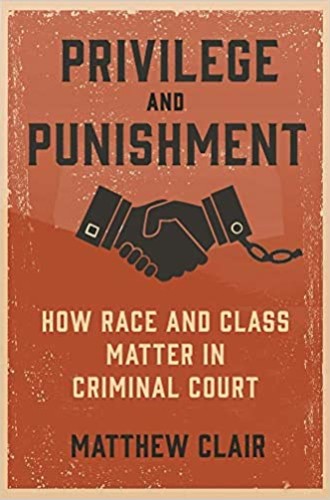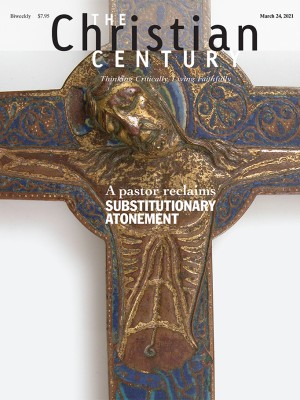Is privilege real or imagined?
Sociologist Matthew Clair explores race and class at work in the criminal court system.
In a groundbreaking 1988 article, Wellesley professor Peggy McIntosh wrote about privilege—specifically, her own White privilege—by identifying 46 real-world instances in which she had the benefit of unearned assumptions that her Black neighbors and friends did not have. She observed, for instance, that she could easily purchase greeting cards, dolls, and toys featuring people of her own race. She noted that she did not need to educate her children to be aware of systemic racism for their own daily physical protection. She also stated that her race would not work against her if she needed legal help or medical care.
Privilege and Punishment digs deep into the truth behind this claim. Matthew Clair, a sociologist who teaches at Stanford University, examines how racial and class privilege work when individuals are subject to the criminal court system. In short, relationships matter, particularly the relationship between a person charged with a crime and their attorney, who may be either retained privately or appointed by the courts to ensure a criminal defendant’s constitutionally guaranteed right to counsel. Relationships also hold the key to perpetuating (or breaking down) systems of privilege.
Read our latest issue or browse back issues.
To reach these conclusions, Clair logged hundreds of hours observing Boston-area court proceedings and attorney-client interactions and interviewing defendants and their attorneys. The defendants he observed came from different socioeconomic backgrounds—middle-class, working-class, and poor. He interviewed dozens of White and Black defendants. (Latinx and Indigenous defendants were a small minority in the study, which largely focused on distinguishing the experiences of White defendants from those of Black defendants.)
Clair observed that defendants were rewarded for deferring to their lawyer’s expertise and the court’s authority, participating in what he calls a relationship of delegation. Defendants were punished for resisting their lawyer’s advice and seeking to marshal their own knowledge and skills in court, which Clair characterizes as a relationship of withdrawal.
In a relationship of delegation, the defendant recognizes that they are inexperienced with the law, engages with their lawyer, and defers to their lawyer’s recommendations on how to proceed in their defense. Clair found that the overwhelming majority of middle-class defendants, White and Black, as well as a majority of White working-class defendants, delegated their legal defense to their attorneys, who were often privately retained.
These defendants often chose their attorney with the help of family or friends, and even when they could not afford a private attorney, they felt heard by their lawyer. As a result, they trusted their lawyer in the face of their own inexperience with the criminal justice system. Clair talked to one young adult defendant, arrested in her early twenties for operating a vehicle while intoxicated, whose mother helped her find a lawyer and who “trusted him because I trust my mom.” Clair witnessed delegation behaviors being rewarded—for instance, with offers by public defenders to assist clients with mitigating collateral consequences of their cases, such as in sealing court records from public exposure.
By contrast, a relationship of withdrawal arises when the defendant does not trust their attorney to manage their defense. This occurred frequently with Black working-class defendants, as well as both White and Black defendants who were poor. In relationships of withdrawal, defendants tend either to disengage and slip into fatalism or to engage in resistance, using their own knowledge and skills—often obtained by reference to people they know and their experiences with the justice system—in court, against their attorney’s advice.
Defendants who lost trust in their lawyer frequently expressed concern that their lawyer did not hear and understand their perspectives or have their best interests at heart. One defendant, for instance, believed that public defenders, her attorney included, are “all buddies with the district attorneys.” Some attorneys for these withdrawn defendants, when speaking with Clair, “readily acknowledged less investment in clients who frustrate them or question their authority.” These defendants may not have constitutional grounds to overturn their convictions based on the ineffective assistance of counsel, which sets an extremely high bar. But Clair suggests that negative reactions to client withdrawal by defense counsel and courts alike “likely contribute to race and class disparities in legal outcomes.”
Clair did not test this latter hypothesis quantitatively, and there are likely too many complex factors that arise in a criminal case to reliably do so. Nevertheless, his study is important as we consider how individuals relate to systems and how we can develop systems that create better conditions for relationships of trust to develop.
As Atticus Finch says to Scout in To Kill a Mockingbird, “You never really understand a person until you consider things from his point of view . . . until you climb into his skin and walk around in it.” When it comes to criminal justice, it’s on those who hold positions of power and privilege to develop systems that foster and reward that kind of empathy.







